A new varsity athlete: The rise of high school, collegiate esports in Indiana and beyond
On the other end of the phone, Nate Thompson is laughing.
Thompson, a teacher at Portage High School, is one of the leaders helping grow esports at the high school level in Indiana. The journey begin during the 2016-17 school year when there were three Indiana high schools participating in competitive video gaming.
Now, heading into the 2022 spring season, Thompson was getting the 80th high school team signed up to participate in esports. In part of his regular teaching duties, Thompson is the Indiana High School Esports Network (IHSEN) executive director and founder.
Thompson expected esports to grow in popularity, but did he expect this rise in just over five years?
"No," Thompson said with a chuckle. "Not at all."
It hasn't been easy bringing esports to the high school level, as there are budgetary and conceptual hurdles to get over, but as it continues to grow across the globe professionally and at the collegiate level, more high schools are seeing opportunities for their students in the realm of video games.
The International 2021: 'Dota 2' team takes home biggest esports prize ever — $18 million
According to the most recent Newzoo Global Esports & Live Streaming Market Report, published in March 2021, global esports revenues were $947.1 million in 2020 and were expected to surpass $1 billion in 2021. In addition, 2020 saw 435.9 million esports viewers, including 215.4 million esports enthusiasts.
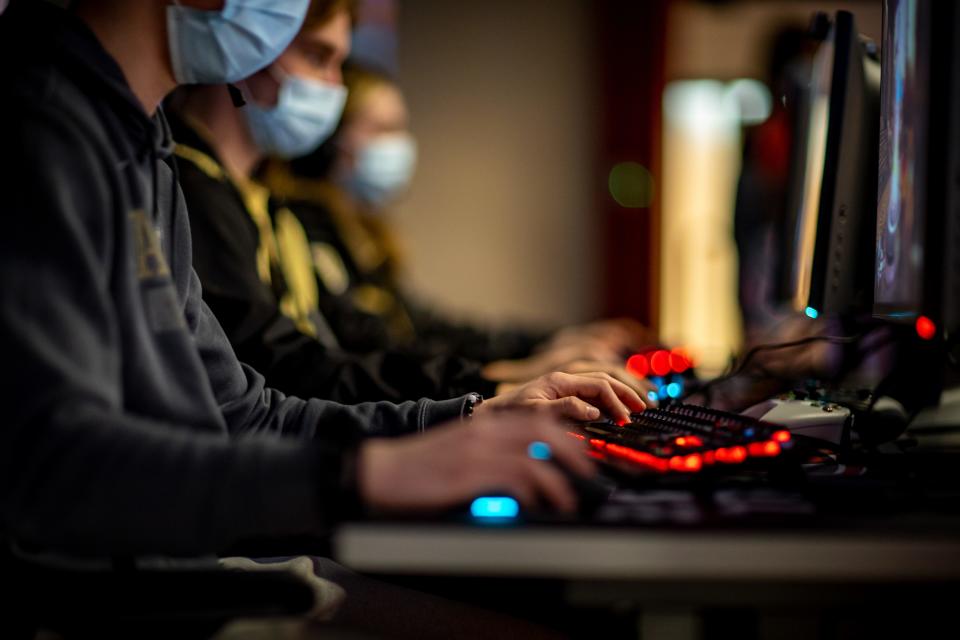
Riot Games announced the Worlds 2021 Finals saw nearly 74 million peak concurrent viewers and an average of over 30 million viewers. Super Bowl LV averaged 96.4 million viewers across all platforms.
Esports' professional popularity is quickly rising to that of traditional sports and educators at both the collegiate and high school levels are taking notice. The rise of esports might be shocking, but Thompson is confident this is just the beginning of a bright future.
"Now that more schools have it more schools are seeing it, and now that they see it, they want to have it, as well," Thompson said. "I do see in the next few years, just about every high school will be questioning about esports or wanting to bring esports into their school.”
Rise of high school esports
The rapid rise of esports, particularly in the past few years, is not unique to Indiana.
Thompson said he talks to the leaders of state esports organizations across the country, similar to IHSEN, and they're seeing the same adoption rate of competitive gaming.
For Indiana high school esports, the journey began back in 2016-17. Working at Munster High School, Thompson was approached by a group of students eager to start a technology club.
The technology club never came to fruition, but an esports team did. After a summer with six students playing Counter-Strike: Global Offensive (CS:GO), there were more than 120 students at the initial esports call-out meeting in a school of about 1,500.
Another omicron casualty: Valve cancels Winter Major for DOTA 2 and nobody is happy about it
Over time, more schools began to form their own esports teams. Some of the largest Indiana high schools — Carmel, Ben Davis, Noblesville and more — formed teams over time. But even some of the smaller schools have jumped aboard.
East Central Indiana high schools Daleville and Wes-Del, which each have fewer than 500 students, were the first two in the area to create teams.
Daleville school resource officer Jeremiah Norris, one of Daleville's three coaches, along with Adam Jones and Tim Crist, had the idea to start the team. Norris saw an interest among students and received the administrative support from former Superintendent Paul Garrison and current Superintendent Greg Roach to pursue it. Norris and Jones said they worked with the Delaware County Redevelopment Commission to acquire base funding for machines and startup costs and got to work.
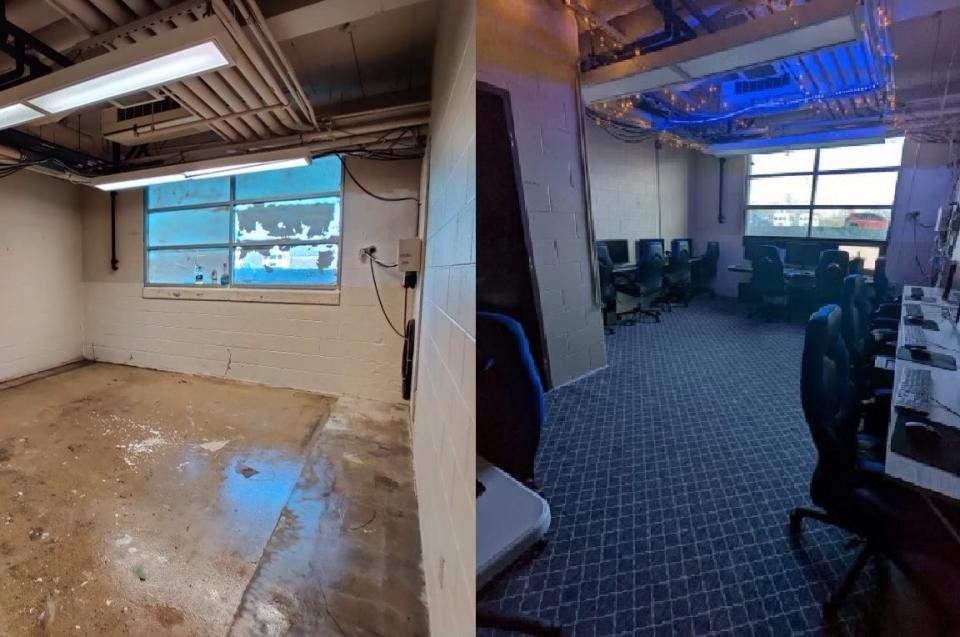
They transformed an old storage closet into the current space Daleville's esports team uses. Norris said they bought the pieces for decent gaming machines and worked with the students, who helped build them.
"We’ve gotten the tools put in place for them, limited as to what they are, but yeah, it’s just kind of grown because there’s interest there with the students and with a huge help, initially, from the redevelopment commission," Jones said.
Norris added: "We had kids that were just ecstatic, like ‘Hey, I don’t know what I’m doing.’ Adam and I are both computer guys and we’re like, ‘That’s fine, that’s perfect, that’s what we want.’ It’s been huge and the program has just grown. It’s unbelievable what we started out a year ago as to where we’re at now.”
Biggest esport gets bigger: Zeri is League of Legends' electrifying new champion
Similarly, Wes-Del English teacher Andrew Romine saw an interest among students. For years, he brought older video games like Dance Dance Revolution or Rock Band to school dances and noticed there were just as many students playing video games as there were at the actual dance.
Romine had discussions with Wes-Del Superintendent Kyle Mealy, checked out other schools' esports facilities and started a team of his own thanks, in part, to money made available through the Betty J. Clark Foundation.
"I built — pieced together is more like — some machines that my kids could play on last year and the year before and it kind of worked out," Romine said. "Now we’re actually getting machines that are brand new that are great machines. It’s going to be nice, I mean, my kids are being a little more competitive and I want to keep the program running and growing and getting better. I’m just really excited by it.”
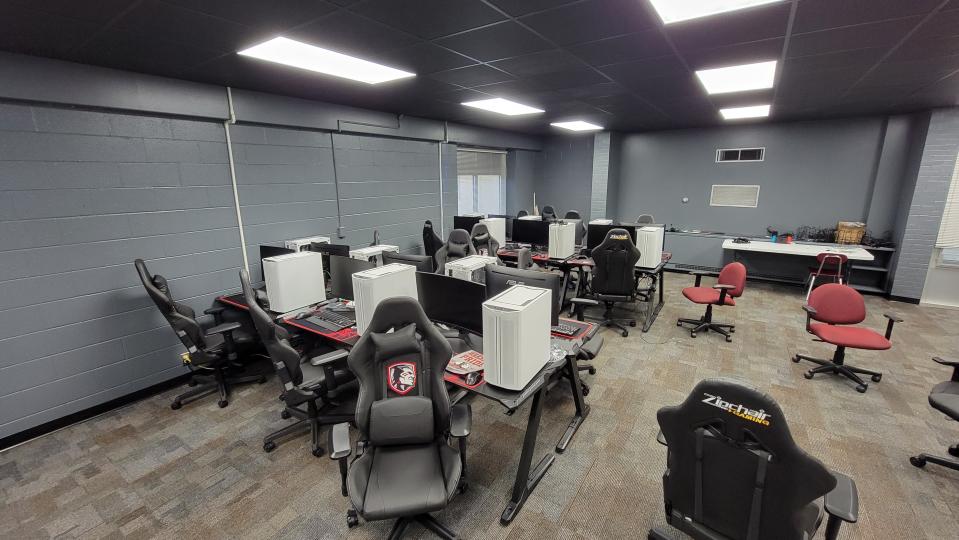
Getting over the hurdle of funding at the high school is not a unique issue to esports, but with funding and administrative support, Daleville and Wes-Del have become two of the now dozens of schools across the state to start esports programs.
The cost of starting an esports program varies as machines can cost anywhere from a few hundred to a few thousand dollars or more for the highest-end machines.
The other part of it, however, is that those machines also help run other high-powered programs like the Adobe Creative Suite. Outside of esports, students at Wes-Del are also learning technological skills, creating graphics, videos and more, according to Romine.
But what leads administrations to support esports programs? Is there really a future in video games?
Future opportunities for students
It might be harder to become a professional video gamer than a professional athlete.
After all, anyone with access to the internet can, in theory, become a professional video gamer, making the competition pool bigger than the one for would-be professional athletes. Plus, the average professional gamer is anywhere from 21 to 25 years old, with most players retiring in their mid-to late-20s or earlier.
So, if the millions of dollars in annual prize money are likely unrealistic for most video gamers to obtain, what career paths are there in esports?
That's the answer Ball State's College of Communication, Information, and Media, along with others, are trying to answer.
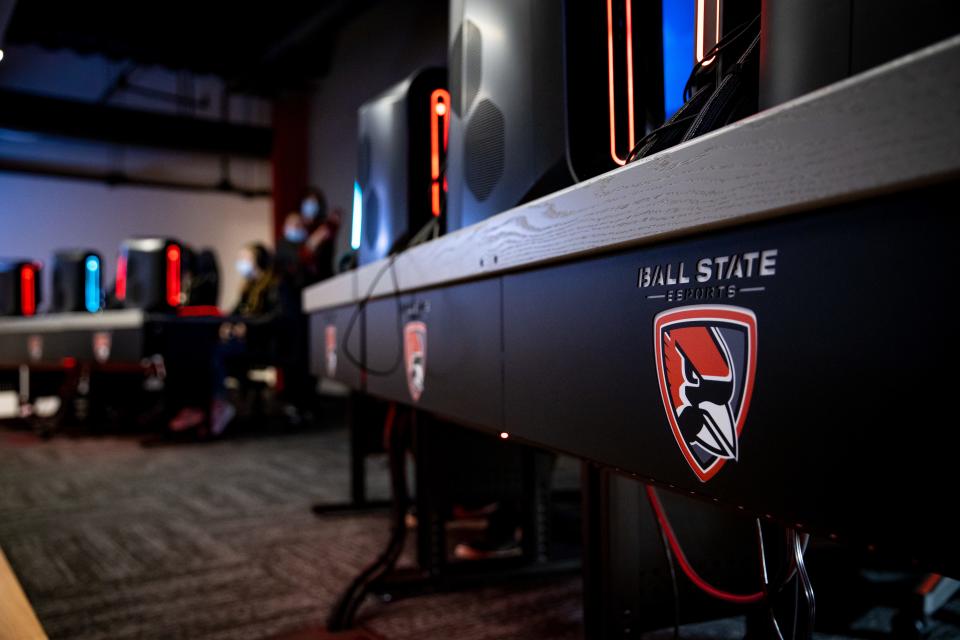
Ball State's 3,611-square-foot Esports Center isn't unique; other schools are also building dedicated esports spaces. But Ball State's emphasis on esports production is what it hopes will separate it from the hundreds of other schools offering esports.
Ball State CCIM Dean Paaige Turner also discussed the possibilities the facility has partnering with the College of Health on subjects such as sports psychology, the Miller College of Business on entrepreneurship opportunities and more.
“What we know is careers are changing faster and faster along with the pace of technology," Turner said. "So, while students may come in here and they may have an esports production concentration, the reality is that job, in 10 years, may be gone again. What we’re hoping for and what we’re committed to is giving our students solid skills that allows them to be transferable to any other industry, any other environment or something that we haven’t even imagined, too.... Those are the things that are going to allow our students to be successful not just in 10 years but 20 and 30 years down the road. That’s what I hope for them and I know that we’re delivering that.”
Big bucks at stake: 7 biggest esports games by prize money in 2021
More so than competing for championships, that's the goal of high school and collegiate esports, to open up the door for career paths students wouldn't have had the opportunity to pursue even a decade ago. At least, not in high school.
Standing inside Ball State's Esports Center, Greg Roach was in awe.
About three decades ago, the Daleville superintendent worked in this same space on Ball State's campus when it was an open computer lab. Even a year ago, this space didn't look anything like it does now with its state-of-the-art computers, stadium seating, a control room, elevated gameplay surfaces and more.
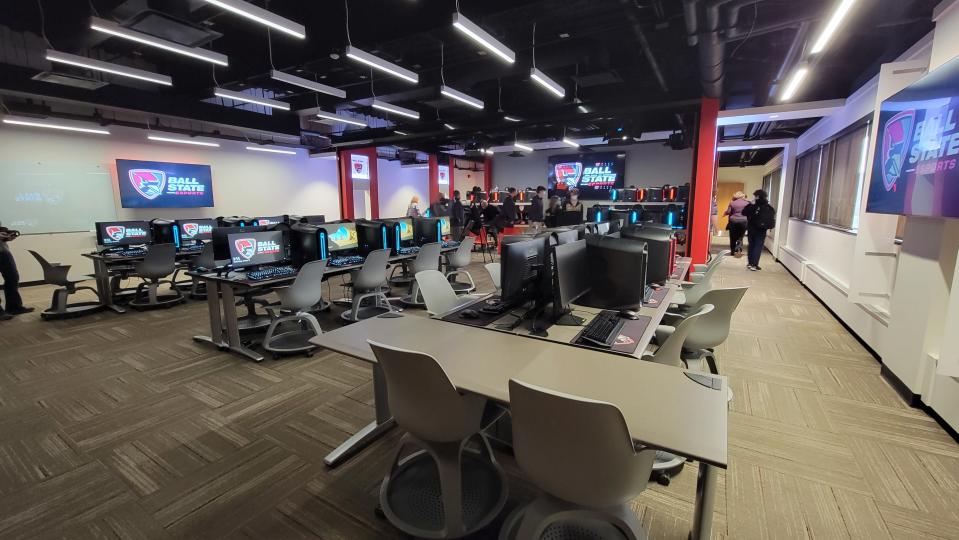
Now, Daleville, which announced a one-year esports partnership with Ball State on Jan. 12, and its students will have access to facilities he never thought would've been possible.
"If you would have told me 20 years ago that my school would’ve had an esports team, I would have said, ‘What are you talking about?’" Roach said.
Professional video gaming has been around for decades, but Ball State's facility, which was inaugurated in April 2021, is a reminder of just how far competitive video gaming has come in such a short time. From conception to realization, the space and academic component to it are less than two years old.
In 2020, the Mid-American Conference unveiled an independent esports conference, Esports Collegiate Conference. There are other competitive esports conferences across the country and, according to the National Association of Collegiate Esports (NACE), $16 million in scholarships and aid available.
Interest and passion in video games is fine — especially if it means being able to earn scholarship money to help pay for higher education — but, like other high school and collegiate athletes, players need to be ready to pursue a career outside their respective sport.
More: 2021’s best moments in esports
“The sad state of esports is you’re less likely to go pro in esports than you are in traditional sports just because it’s so volatile, it’s so competitive and esports skews younger right now at the professional level," Ball State director of esports Dan Marino said. "But that doesn’t mean you can’t gain valuable career skills and push to something bigger in esports afterwards."
From production to business, computer programming, web content creation, broadcasting, design, coaching, STEM fields, marketing and more, the real-world applications to esports are plentiful.
That's why Thompson is working as a sort of organizer to help programs get started.
"It’s not just what I want to do," Thompson said. "I’m here to help everybody achieve what they want to set as their own goals. I will do that by bulldozing things out of the way for them. I will give them the structures that they need to compete, I will absolutely do different titles with them, but realistically I’m there just for structure.”
Inside the schools, while video games may draw students in, there are also hidden benefits to participation.
"The gaming and the competition part is the fun part and the dirty little secret on the backend is we’re exposing them to all these other things that, you know, that they may not have dreamed of before," Jones said.
A new varsity athlete
For every sport, there's a typical athlete build to compete. But the future college athletes are here and they come in all different shapes and sizes.
They're not your typical built linebacker, shifty guard or springy volleyball player. There is no ideal body type a competitive video gamer must have, just quick hand-eye coordination and willingness to work on their craft.
Wes-Del senior captain James Burke, who played football until he blew out his knees, decided to join the Warriors' esports team after transferring from Muncie Central. He was in the band and played video games casually, but decided to join the esports team.
"I have over 1,000 in 'League (of Legends),'" Burke said. "I might as well use them somewhere."
And while there are some who might not see esports as a traditional sport, the same skills — communication, teamwork, camaraderie, critical thinking and more — that video gamers use are the same ones traditional athletes must also have.
"Hand-eye coordination, like with basketball or football or whatever, you need a lot of because what you see on screen, you have to be able to translate it to what movement I need to do," Burke said. " … It’s a lot of processing the same way you process a physical sport, but then there’s also the, like, mind games behind it from a lot of them. Like, how am I going to work with my team here?"
In fact, Burke knows several athletes who would be on the esports team if it weren't for their traditional sport.
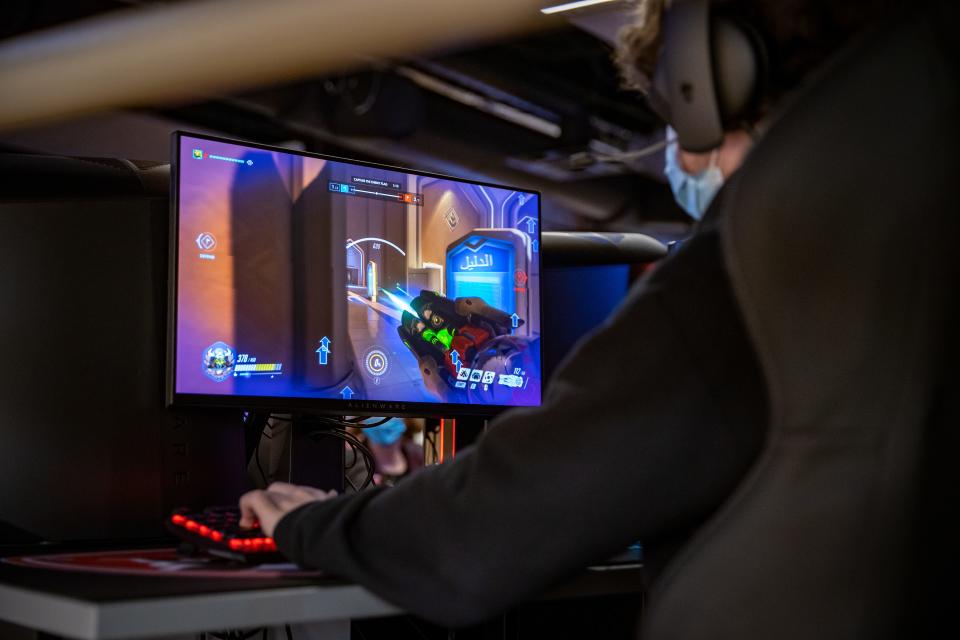
But what esports has done has opened up doors to students who, traditionally, wouldn't be involved in their high schools. Students who would go to class and go home without even thinking twice about it. Students who might not necessarily have the athletic skills to participate in sports, but the same drive and other skills to excel in a different kind of team setting.
"There are kids that are different and it gives them an opportunity to participate for our school in a way that they would have never had the opportunity for," Romine said.
Norris added: "This is kind of their escape and this is their chance to take part in the high school experience, being proud to represent you school where otherwise they just kind of go on about their daily lives."
Dan Marino has helped build Ball State's program the past three years after helping lead the collegiate program at the College of Saint Rose in Albany, New York, and founding Owlet Esports, a program that helps individuals in playing, coaching and broadcasting esports.
Marino is hoping to identify these students at a younger age, ones who might be unaware of the professional opportunities in video gaming, and recruit them much like a football or basketball coach does. There are over 700 students involved in Ball State's esports club, 52 of whom are involved on the varsity team.
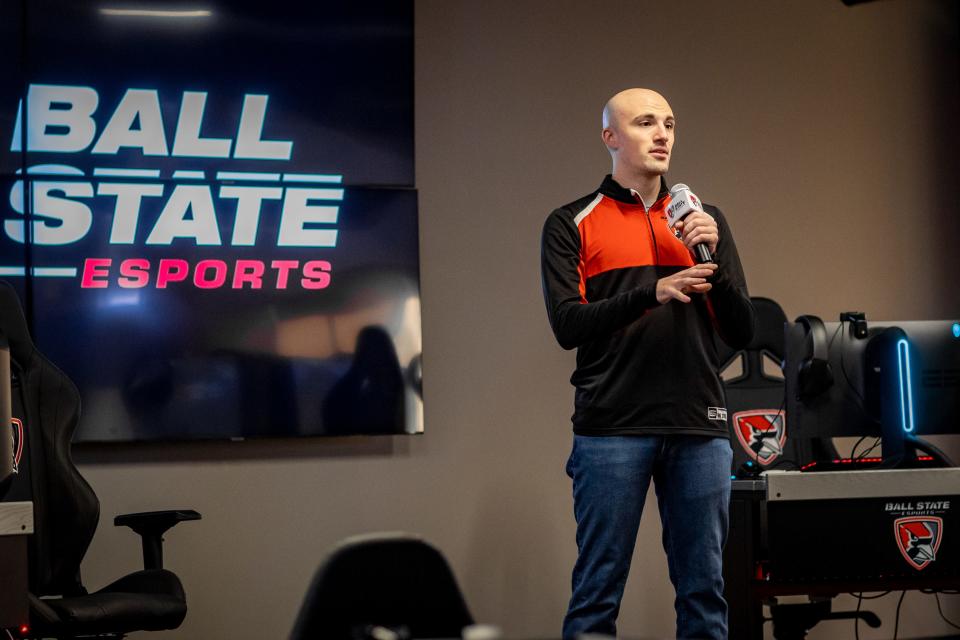
And, much the way traditional coaches and players strive to win, Marino wants Ball State to have that same mindset, showing the best players their facilities and convincing them to enroll at Ball State.
What does the future of esports look like? Who knows? But everyone involved in esports seems positive. The monetization of name, image and likeness (NIL) among college athletes opens up a whole new world where students can earn sponsorship deals, as an athlete and streamer, and compete for their collegiate programs.
“For Ball State, we have our foot firmly on the gas," Marino said. "... I’d really like to have our varsity team be national contenders in all the games we play. I’d really like to see our production program take off and be able to do more high-scale productions.
He added: “Nationwide I hope it just continues to grow. I think kind of tying back to as those classes graduate, students will have a sort of esports mind and be able to appreciate it more because, obviously as we started, our alumni were like, ‘What’s esports?’ We’ve graduated about two classes, three classes now as an industry that really do understand esports and kind of have that connection and appreciation. I think as we put more students through college campuses, there will be even more. It’s just going to keep growing as the population kind of embraces it more.”
At both the high school and collegiate level, there's a hope that esports becomes the next varsity sports team. Where students cheer on their classmates and build rivalries with schools on a different kind of playing field.
“It’s not just video games," Thompson said. "Kids aren’t just hanging out after school playing video games. Kids are, after school, on computers, on Xboxs, playing the games that they love at a high level against other schools in the state and they’re working hard on it. Yeah, it’s relaxing at times, but for them they’re taking it very, very seriously like a serious competition because to them it is a serious competition. They see what they can do, they see what they can do in the future with esports.
"For people to downplay that is, I believe, ridiculous. We have everything traditional sports has."
Robby General covers Ball State and East Central Indiana high school athletics for The Star Press. Contact him via email at rgeneral@gannett.com, on Twitter @rgeneraljr or phone at 765-283-8864.
This article originally appeared on Muncie Star Press: Indiana esports: Competitive video gaming in high school, colleges

